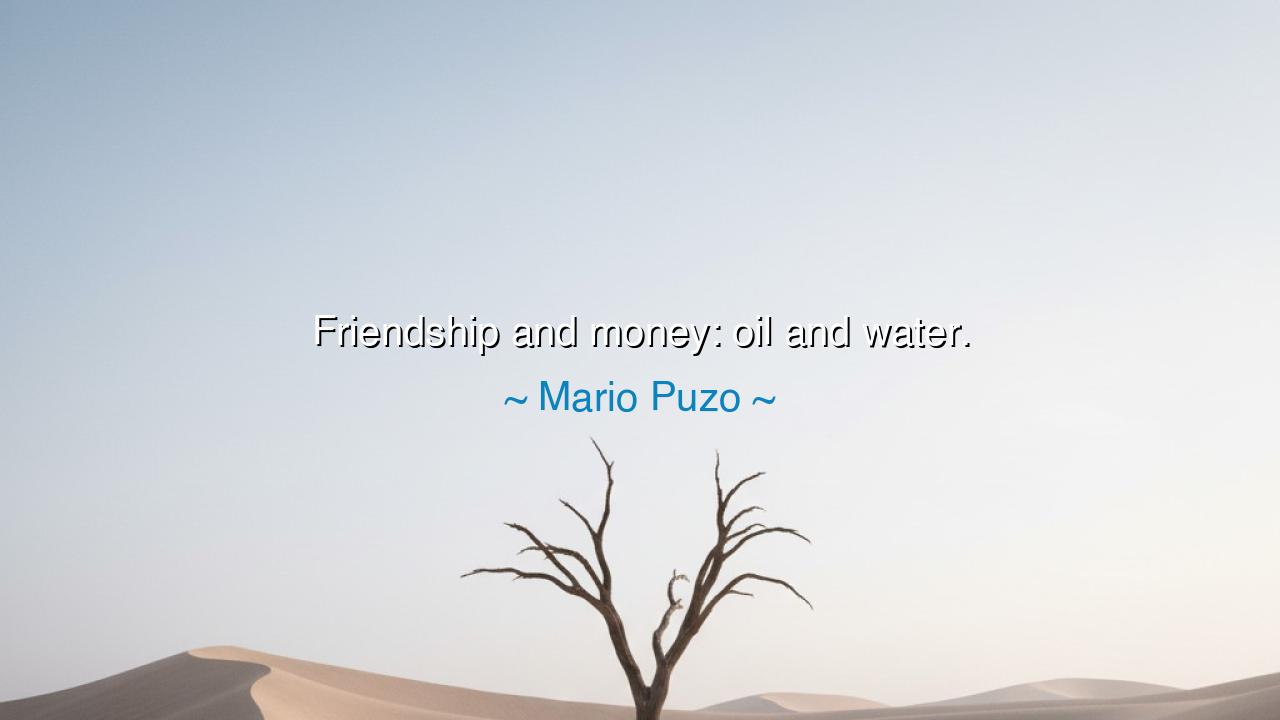
Friendship and money: oil and water.






Mario Puzo, the great chronicler of loyalty, betrayal, and power, once wrote with unflinching wisdom: “Friendship and money: oil and water.” In this brief and potent saying, he captures a truth as old as civilization itself — that wealth and friendship, though often brought together by circumstance, rarely coexist in harmony. Like oil and water, they may share the same vessel for a time, but they will never truly blend. One rises above, the other sinks beneath; one nourishes, the other divides. Puzo, who gave voice to the human heart through the shadowed world of The Godfather, understood deeply that money can corrupt what love builds, and that friendship, once stained by greed, seldom regains its purity.
The origin of this insight comes not from Puzo’s imagination alone, but from the world he observed — a world of family, honor, and power intertwined with wealth. Through his novels, he showed that loyalty, when tested by gold, often reveals its true worth. He saw how even the strongest bonds could fray when money entered their midst, for money changes the heart. It introduces hierarchy where there was once equality, suspicion where there was once trust, and pride where there was once humility. Thus he likens it to oil and water, two elements that resist all union; for while friendship flows in warmth and sincerity, money congeals in calculation and self-interest.
True friendship, by its nature, is selfless. It is founded on mutual respect, shared experience, and the quiet assurance that one is loved for who they are, not for what they have. Money, on the other hand, is the language of transaction — it demands accounting, it weighs value, it seeks advantage. When these two forces meet, the spirit of friendship begins to tremble. For where money enters, the purity of motive is tested: are we helping our friend out of love, or expecting return? Are we giving freely, or keeping count in secret? These questions, once raised, corrode the sanctity of the bond. Like oil upon water, money forms a sheen that dulls the reflection of trust.
History, in its endless mirror, shows us the ruin born of this mixture. Consider the tale of Marcus Licinius Crassus and Gnaeus Pompeius Magnus, friends and allies of Julius Caesar in the first Roman triumvirate. At first, they were united in purpose — ambition, power, and the governance of Rome. But beneath their alliance ran the currents of gold and envy. Crassus, the richest man in Rome, sought glory equal to his wealth; Pompey, the great general, desired wealth to match his fame. Their friendship, built on convenience rather than virtue, was shattered when the balance tipped. Greed drove them to competition, and competition to distrust. In the end, their partnership dissolved, and with it, the fragile peace of Rome. Thus did the friendship of men drown in the tide of money — as oil and water cannot share the same vessel, so loyalty and greed cannot share the same heart.
Yet Puzo’s teaching is not a condemnation of wealth itself, but a warning to the human soul. Money, in its place, is a useful servant; but when it intrudes upon the realm of the heart, it becomes a tyrant. A true friend may give freely, even generously, but not as a merchant — rather as a brother or sister who shares in both fortune and hardship. When friendship is pure, it is blind to the scales of exchange. It asks not, “What do I owe?” but “What can I offer?” The moment that question changes — the moment friendship becomes a ledger — the bond weakens. For friendship, like water, is meant to flow without measure; money, like oil, measures all by weight and worth.
And yet, my children of discernment, there are those who believe they can mix the two — who lend money to friends expecting gratitude, or who take it expecting no consequence. But in most cases, sorrow follows. Either resentment grows in the giver, or shame festers in the receiver. Thus, the wise avoid placing gold between hearts. They keep the realms of wealth and affection apart, as one separates fire from flax. If a friend is in need, give as though you were giving to yourself — not as a creditor, but as a companion. And if you borrow, repay not just with money, but with loyalty and honor. In this way, you preserve the friendship even as you fulfill the need.
So let this truth of Mario Puzo be remembered and carried through the generations: “Friendship and money: oil and water.” They cannot mix without loss. If ever they are brought together, let friendship rule and money submit. Choose always to value the bond over the coin, for money, once spent, can be regained — but a friendship betrayed is gone forever. Guard your friendships, therefore, as sacred trusts, untainted by the glitter of wealth or the poison of greed.
And when you find a friend whose love is pure, who values your heart over your possessions, hold fast to them. For such friendships are the rivers of life — clear, flowing, and free. They refresh the soul, while money, like oil, floats above for a time but eventually drifts away. In the end, the wise know this: gold may fill your hands, but it is friendship that fills your spirit. And between the two, only one endures beyond the grave.






AAdministratorAdministrator
Welcome, honored guests. Please leave a comment, we will respond soon